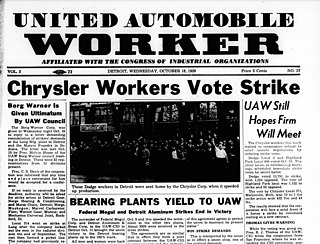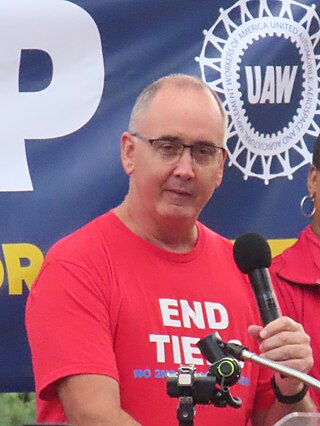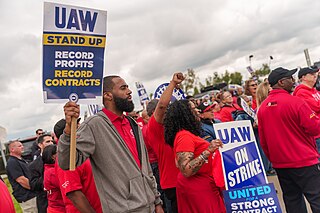Related Research Articles

Walter Philip Reuther was an American leader of organized labor and civil rights activist who built the United Automobile Workers (UAW) into one of the most progressive labor unions in American history. He saw labor movements not as narrow special interest groups but as instruments to advance social justice and human rights in democratic societies. He leveraged the UAW's resources and influence to advocate for workers' rights, civil rights, women's rights, universal health care, public education, affordable housing, environmental stewardship and nuclear nonproliferation around the world. He believed in Swedish-style social democracy and societal change through nonviolent civil disobedience. He cofounded the AFL-CIO in 1955 with George Meany. He survived two attempted assassinations, including one at home where he was struck by a 12-gauge shotgun blast fired through his kitchen window. He was the fourth and longest serving president of the UAW, serving from 1946 until his death in 1970.

The United Auto Workers (UAW), fully named International Union, United Automobile, Aerospace and Agricultural Implement Workers of America, is an American labor union that represents workers in the United States and southern Ontario, Canada. It was founded as part of the Congress of Industrial Organizations (CIO) in the 1930s and grew rapidly from 1936 to the 1950s. The union played a major role in the liberal wing of the Democratic Party under the leadership of Walter Reuther. It was known for gaining high wages and pensions for automotive manufacturing workers, but it was unable to unionize auto plants built by foreign-based car makers in the South after the 1970s, and it went into a steady decline in membership; reasons for this included increased automation, decreased use of labor, mismanagement, movements of manufacturing, and increased globalization.
The Communist Party (CP) and its allies played a role in the United States labor movement, particularly in the 1930s and 1940s, but largely wasn't successful either in bringing the labor movement around to its agenda or in converting their influence in any particular union into membership gains for the Party. The CP has had only negligible influence in labor since its supporters' defeat in internal union political battles in the aftermath of World War II and the Congress of Industrial Organizations's (CIO) expulsion of unions in which the party held the most influence in 1950. The expelled parties were often raided by stronger unions, and most withered away.

Douglas Andrew Fraser was a Scottish–American union leader. He was president of the United Auto Workers from 1977 to 1983 and an adjunct professor of labor relations at Wayne State University for many years.
Detroit Assembly Complex – Jefferson, previously known as the Jefferson North Assembly Plant is a Stellantis North America automobile assembly factory in Detroit, Michigan. The plant is located adjacent to the Detroit Assembly Complex – Mack plant. Located on East Jefferson Avenue 6 miles (9.7 km) northeast of Downtown Detroit, near Grosse Pointe Park, the factory opened in 1991 as a major commitment to the downtown Detroit area by Chrysler, and was expanded in 1999, bringing its area to 2,700,000 sq ft (250,000 m2) and expanded again in 2011, bringing its total to 3,000,000 sq ft (280,000 m2).

Roland Jay Thomas, also known as R. J. Thomas, was a left-wing leader of the United Auto Workers in the 1930s and 1940s. He grew up in eastern Ohio and attended the College of Wooster for two years. The need to help support his family caused him to leave college and go to work. In 1923, he moved to Detroit, where he worked in a number of automobile plants.
Owen Frederick Bieber was an American labor union activist. He was president of the United Auto Workers (UAW) from 1983 to 1995.
Nelson "Jack" Edwards (1917–1974) was Vice President of the UAW, and a founder of CBTU, the Coalition of Black Trade Unionists.

Leon E. Bates Sr. was an American labor union leader with the United Auto Workers union (UAW) from 1937 to 1964 when he retired as an "International Representative" of the UAW. He was one of the first African-American union organizers to work for the "UAW-CIO".
The Alliance for Labor Action (ALA) was an American and Canadian national trade union center which existed from July 1968 until January 1972. Its two main members were the United Auto Workers (UAW) and the International Brotherhood of Teamsters, although it had some smaller affiliates.
Olga M. Madar was the first woman to serve on the United Auto Workers (UAW) International Executive Board.
The tool and die strike of 1939, also known as the "strategy strike", was an ultimately successful attempt by the United Auto Workers Union (UAW) to be recognized as the sole representative for General Motors workers. In addition to representation rights, the UAW, working jointly with the Congress of Industrial Organizations (CIO), sought to resolve existing grievances of skilled workers.

The Chrysler Auto Strike began in October 1939 at the Dodge Main Plant in Detroit, Michigan, as a struggle between the Chrysler Auto manufacturer and the International Union, United Automobile, Aerospace and Agricultural Implement Workers of America, better known as the United Auto Workers (UAW).
Stellantis N.V. is a multinational automotive manufacturing corporation formed from the merger of the Italian–American conglomerate Fiat Chrysler Automobiles (FCA) and the French PSA Group. The company is headquartered in Amsterdam. As of 2022, Stellantis was the world's fourth-largest automaker by sales, behind Toyota, Volkswagen Group, and Hyundai Motor Group.
Nat Ganley, or Nat Kaplan, was a socialist and later communist journalist who became a union organizer in the 1930s, particularly for the United Auto Workers of America. He was tried and convicted in 1954 for violating the Smith Act, but his conviction was later overturned.
Lillian Hatcher (1915–1998) was an African American riveter and union organizer. She was employed at the Briggs aircraft plant in Detroit when she first became active in union organizing after the company transferred a group of female employees, white and black, all of whom had children, to the midnight shift.

Shawn Fain is an American labor unionist who has served as president of the United Auto Workers (UAW) since March 2023. An electrician by trade, he worked at a Stellantis automotive parts plant in Kokomo, Indiana. He has been a UAW member for 29 years, and is a member of the reform caucus, Unite All Workers for Democracy (UAWD). Fain was the first UAW president directly elected by the union's members, and was a central figure in the 2023 United Auto Workers strike.
General Holiefield was an American labor union leader.
Mary Elizabeth Bunn is a former American labor unionist.

The 2023 United Auto Workers strike was a labor strike involving automobile workers in the labor union United Auto Workers (UAW) and the three unionized automakers in the United States—Ford Motor Company, General Motors, and Stellantis. These three automakers' factories combined employ about 145,000 UAW members and produce about 50 percent of the vehicles manufactured annually in the US, accounting for 1.5 percent of US GDP. The strike began on September 15, 2023, when the union was unable to reach a deal with the three automakers. It was the first trilateral strike against the three automakers in the union's history.
References
- 1 2 "Women's History Month: A Q & A with the UAW's Cindy Estrada". MotorCities.org. 2021. Retrieved 14 March 2023.
- 1 2 "Detroit-based group fights for the rights of union workers". HispanicExecutive.com. 2 July 2012. Retrieved 14 March 2023.
- ↑ "Cindy Estrada". Crain Communications . 28 June 2018. Retrieved 11 March 2023.
- ↑ Quinnell, Kenneth (21 March 2022). "Women's History Month Profiles: Cindy Estrada". AFL–CIO . Retrieved 13 March 2023.
- ↑ Lessenberry, Jack (10 March 2016). "An Hour With… Cindy Estrada". Hour Detroit . Retrieved 14 March 2023.
- ↑ Wayland, Michael (27 August 2019). "Federal probe into union corruption expands to General Motors". CNBC . Retrieved 17 March 2023.
- ↑ Lawrence, Eric D. (7 March 2022). "Estrada, who heads UAW's Stellantis Department, won't seek election for new term". Detroit Free Press . Retrieved 14 March 2023.
- ↑ Kullgren, Ian (9 March 2022). "AFL-CIO's Shuler 'Disgusted' by UAW Corruption, Mulled Removal". Bloomberg Law . Retrieved 11 March 2023.
- 1 2 Dobuzinskis, Caroline (14 May 2014). "One on One with Cindy Estrada, Union Leader". Institute for Women's Policy Research . Retrieved 16 March 2023.
- ↑ "UAW Vice President Cindy Estrada Receives Jewish Labor Committee's Human Rights Award". United Auto Workers . 9 December 2021. Retrieved 17 March 2023.